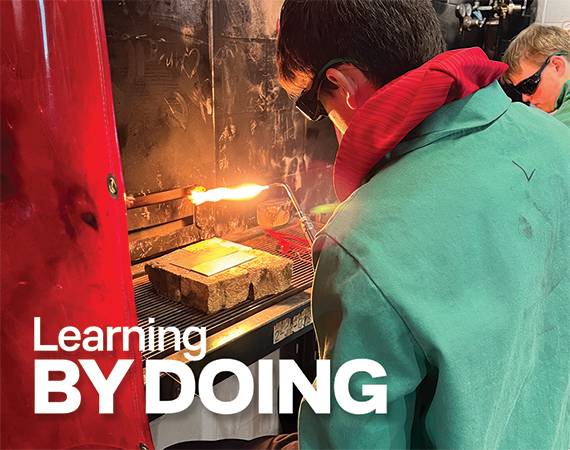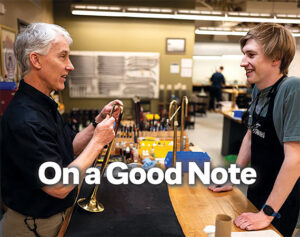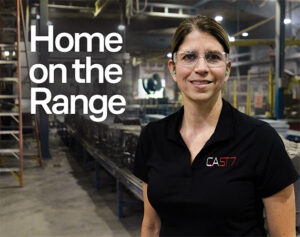For many high school students, the path to deciding what’s next after graduation can be difficult. To help juniors and seniors broaden their perspective and gain more visibility to manufacturing career opportunities, Minnesota school districts are partnering with businesses, chambers of commerce, and technical colleges to create early learning and immersive manufacturing experiences through Career and Technical Education (CTE) programs.
School districts work with the Minnesota Department of Labor and Industry Youth Skills Training (YST) program to develop classroom instruction, offer safety training, certifications, and industry-recognized credentials, and paid work experience/internships in high-growth and high-demand occupations. Grants of up to $100,000 over a two-year period are available through application; however, grant funding is not mandatory to operate a YST program.
“YST is a framework that is adaptable to community, school, and business needs across the state,” says Jo Daggett, YST program manager. “Through the YST program, our team works to support the development of partnerships between schools, industry employers, and communities in responsive and meaningful ways that create long-term stability and a positive impact.”
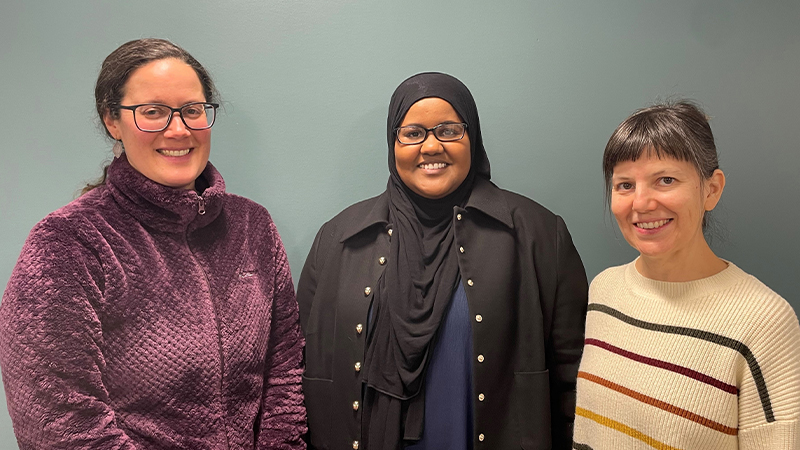
Programs vary across the state based on area manufacturing businesses and student interest. Here are some examples of how the program helps students.
ISD 761: Owatonna
While the school district works with many businesses, their biggest programs are with two companies: Climate by Design International (CDI), which designs and manufactures air handling units and dehumidifiers, and Wenger Corporation, which provides innovative products for music and theater education and performing arts venues.
Tom Peterson, owner of Climate by Design, remembers having a work experience program when he was in high school and offered to get the ball going with their company, says Brian Coleman, a career navigator with the district. Today, CDI maintains about 15 students annually.
YST businesses support the district by participating in high-school career fairs, job shadowing, and a unique signing day experience for students who decide to transition from an internship to full-time employee after graduation, explains Coleman. Students and their families tour the facility, then sign their first employment contract and receive a special welcome.
Coleman and Missy Koch, also a career navigator, see that students in the program are their best recruiters for the business, supporting other students to pursue work opportunities because they share what they are working on and why they enjoy it.
ISD 831: Forest Lake
By creating a flexible YST framework, many area manufacturing businesses can offer students in the Forest Lake Area Schools unique manufacturing career insight.
“Not all businesses participating in our [CTE/YST] programs are able to provide paid student internships and yet they still want to support students as they explore career opportunities, including manufacturing,” says Molly Bonnett, a college and career coordinator with the district. “We created an a la carte framework, which might mean a business comes in and talks to the students at a career fair, hosts a field trip tour at their business, or provides a single day job shadowing opportunity.”
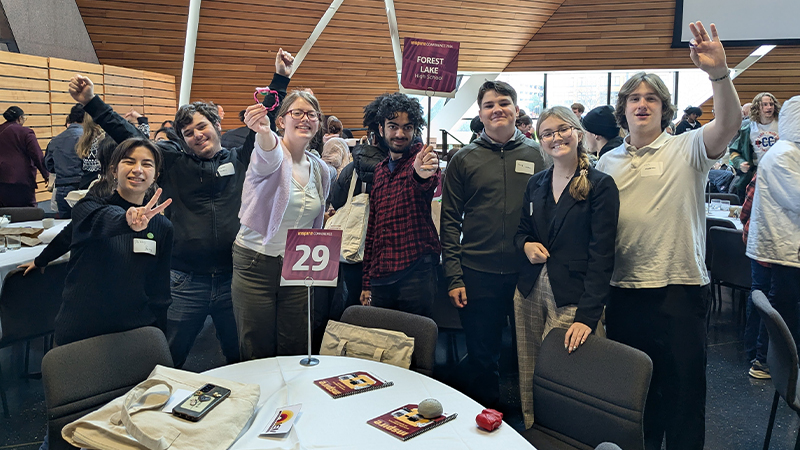
Through a YST grant, Forest Lake expanded their CTE and offers career exploration courses and created a coordinator position that supports business relationships, lines up student internships, and supports students from resume writing and interviewing through on-the-job meetings with supervisors.
“I really enjoy seeing these students develop and find their paths through shadowing and internships,” says Mike Miron, a career and technical education coordinator with the district. “We had a student graduate in 2023 who did a job shadow in the auto body business and realized it wasn’t a good fit for him. He wasn’t really an AP science/math guy, but through a CAD course he realized he enjoyed drafting and started to think engineering might be a career path. While completing his internship at Velosity, a contract manufacturing and injection molding company, they placed him with the engineers and gave him some drafting work. He proved himself and found his path. He went on to complete a two-year track at Dunwoody [College] and was just offered a full-time position at Velosity as an engineer.”
ISD 31: Bemidji
The Bemidji school district has created many lasting community and business relationships for their students in a variety of career areas including manufacturing.
“The field trips and internships help our students understand there are in-demand and high-paying manufacturing jobs and career growth opportunities that will enable them to stay in this area, build a career, and have the lifestyle they enjoy outside of the Twin Cities,” says Jenny Fraley, school counselor and Bemidji career academics coordinator. In addition to internships, Fraley values student interaction with non-parental adults who encourage them and share new perspectives. “It’s a great way to boost their confidence and introduce them to life in the working world, with guidance,” she says.
“Our kids sometimes fail to grasp how their classroom work relates to the real world,” says Jason Stanoch, principal. “We had a student who just hadn’t found his career path, and he shared with his internship mentor that he didn’t think he would graduate. The mentor pulled out a job application and showed him the first question was about graduating from high school. That mentor and other co-workers encouraged the student to complete his degree, and he did.”
ISD 11: Anoka-Hennepin
Anoka-Hennepin, Minnesota’s largest school district, uses the YST program to explode old-school myths about careers in manufacturing.
“Our students quickly realize through our field trips that manufacturing businesses are unique, and there are high-growth and high-paying jobs in these businesses,” says Carter Gerlach, Anoka-Hennepin’s trade and industry internship coordinator.
Participating in shadowing days and internships also helps students find that at times the job just isn’t what they thought it would be, or that this just isn’t their passion. These opportunities offer growth and learning that are equally welcomed by the employer and the students.
Today’s student can more fully experience real-life work environments that past child labor laws would have prohibited. To ensure students are working safely, OSHA (Occupational Safety and Health Administration) certifications are offered through many schools and employers and become another differentiator on their student-to-adult resume.
ISD 728: Elk River
The Youth Skills Training grants have helped ISD 728 pay salary costs associated with its work-based learning teacher position within its CTE internship program, which helps students earn high school credits, learn about labor laws, safety on the job, and how to navigate the world of work — such as getting along with co-workers, taking time off, being on time and prepared, and proper cell phone use. The YST program has the support of industry credentials from OSHA 10, DOT Inspection, and other courses. “I am grateful for the YST grants for helping our district implement stronger career pathways and the CTE internship program — students and the community will benefit!” says Amy Lord, a program coordinator.
“We truly support students as they explore diverse career paths, identify their strengths, and build essential employability and technical skills,” continues Lord. “Internships are invaluable. They boost student confidence, foster valuable mentor relationships, and provide real-world experience that helps students determine the necessary certifications or education for their future success. While some students may discover that a particular internship isn’t the right fit, others will find their niche. Some may not have even known these jobs existed in their communities prior to this program.”
ISD 22: Detroit Lakes
In 2016, Detroit Lakes established an academy model to expose students to high-demand and high-paying jobs in the area. They have added a program in plant sciences and greenhouse management that supports a strong student interest to work at Bergen’s Greenhouses, one of the largest local manufacturers.
“This is the 15th year of our program, and it has taken some time to get it up and running,” says Vern Schnathorst, teacher and school-to-work program coordinator. “Through Bergen’s and other local businesses, we are offering our high school students unmatched opportunities to grow a manufacturing-based career right here in the Detroit Lakes area.”
ISD 882: Monticello
The Monticello school district has about 16 businesses that provide internships, but budget challenges have kept some companies from taking on paid interns.
The district also offers internships and a variety of career exploration opportunities through high school courses, as well as the Wright Technical Center, the last of its kind in the state of Minnesota. Their state grant enables Monticello to provide career opportunities in health care, teach CPR/first-aid certification courses, a CAN course, and a couple of CIS medial related courses. This has diversified their internship opportunities in health care, manufacturing, and other industries.
The Wright Technical Center provides career, technical, and alternative education for students across eight schools in Wright County. Located in Buffalo, the school offers experiential and individualized learning opportunities for students on a variety of career paths from health care to automotive and manufacturing.
“Prior to the CTE program, students couldn’t work in many positions due to child labor laws. Now, high school juniors and seniors can experience hands-on opportunities with safety guards in place,” says Rebecca Kounkel, Monticello High School career pathways coordinator/YST internship coordinator. “Through our CTE offerings, we are able to provide early career exposure in a variety of opportunities with support on every level from writing the resume, applying, interviewing, and safety certifications to learning how to speak to your boss, when to take breaks, and how to work with a difficult co-worker.”
Pathways to the future
“Mainstreet in rural to urban communities is strengthened by manufacturing,” says Bob Kill, president and CEO of Enterprise Minnesota. “In Minnesota, 11% of the workforce is in manufacturing, which drives 14-14.5% of the state’s payroll. And we can all see that the economic strength of our communities and businesses is dependent on students’ understanding that Minnesota manufacturing offers strong, diverse career opportunities in manufacturing and pathways to the future.”
Today schools, technical colleges, chambers of commerce, and the Minnesota Department of Labor and Industry are creating early and enticing opportunities for students to learn about a variety of high-paying, high-need, and high-growth career opportunities in manufacturing.
Return to the Fall 2025 issue of Enterprise Minnesota® magazine.
